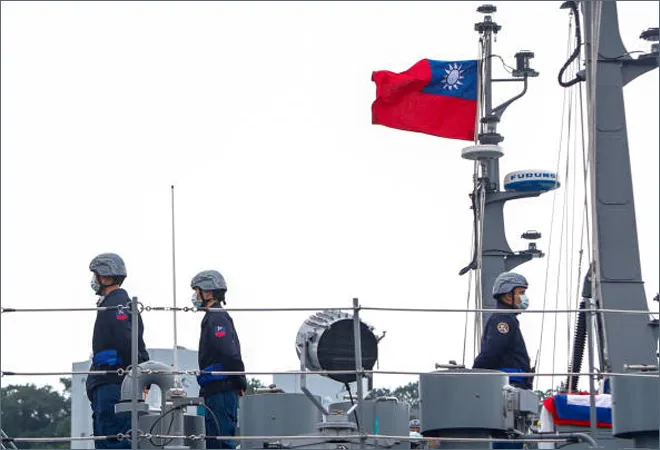-
CENTRES
Progammes & Centres
Location
China’s belligerence across the Taiwan Strait raises tensions in the Indo-Pacific.

This year, the National Zoo in Washington D.C., which is part of the Smithsonian family celebrated 50 years of the panda. It’s no surprise the adorable bamboo-eating cherubic animals arrived in 1972, the same seminal year of former President Richard Nixon’s historic visit to China, the start of the détente and thus the birth of the ‘One China Policy’. It was called “the week that changed the world,” according to Ambassador Nicholas Platt, who accompanied the President on that visit. The visit played a key part in the US emerging as the eventual victor of the Cold War with Beijing now in the Washington camp. However, things have changed with the escalation of the US-China rivalry.
At its core, the One China Policy cannot tolerate the fact that Taiwan is inherently a part of China. Beijing sees Taiwan as a renegade province and one whose reunification with the mainland is both inevitable and necessary for the completion of a fully unified China.
The visit played a key part in the US emerging as the eventual victor of the Cold War with Beijing now in the Washington camp.
US-China relations have ebbed and flowed through the years. From security concerns in the Indo-Pacific region the lack of transparency into the origins of the COVID-19 virus from Wuhan trade issues and devaluing of the Yuan currency to technology transfers and patent infringements. However, this time, it was Beijing who expressed umbrage.
Speaker Pelosi’s recent visit to Taiwan has thrown caution to the wind as relations between Washington and Beijing experienced another lull in the Xi Jinping era.
Bearing stark difference from the Deng Xiaoping era of “hide your strength, bide your time”, under Xi, China has been flexing its economic and military clout in the region, through various coercive means, from wolf-warrior diplomacy to economic debt traps for fragile economies. The island of Taiwan has been front and centre on Xi Jinping’s radar since 2016.
President Xi has spoken about the eventuality of the reunification of Taiwan with the mainland, while President Biden, in the backdrop of Russia’s Ukraine invasion, was perhaps tempted to answer, “Yes” as a riposte to a reporter’s question on whether Washington would “intervene militarily to defend Taiwan”, should China invade.
President Biden, albeit far different from his predecessor and former election rival, President Donald Trump, is continuing Trump’s policy of consolidating relations with Taiwan and thus making it a central pillar in the US-China brouhaha. Chinese Foreign Minister Wang Yi said “under the guise of democracy, the US is infringing on China’s sovereignty”, as Beijing is continuously irked by any measures that allude to Taiwan as an independent state. It’s not just the rhetoric that’s escalating, as People's Liberation Army (PLA) military drills ramp up near the coast of Taiwan. Chinese fighter jets carried out simulated attacks as they flew close to Taiwan’s airspace, while Beijing’s warships came flirtingly close to Taiwan’s ports and rockets lit up the skies over the Strait.
The concerns are multifold, on one hand, at a core security level, plenty of parallels have been drawn between Ukraine’s vulnerability and that of Taiwan, as they come in the crosshairs of revanchist aggressors.
Secondly, experts, also allude to economic strangulation in the form of a blockade.
Chinese fighter jets carried out simulated attacks as they flew close to Taiwan’s airspace, while Beijing’s warships came flirtingly close to Taiwan’s ports and rockets lit up the skies over the Strait.
Taiwan, as the world’s leading semiconductor manufacturer, is a key part of global supply chains that have been upended by the pandemic. For the Indo-Pacific Quad, two key factors have been supporting critical and emerging new technologies and helping to rebuild and recreate resilient supply chains.
Furthermore, the specter of military might on display will accentuate the role of AUKUS, a security trilateral between Australia, the United Kingdom, and the US, and increase military coordination among Indo-Pacific Quad partners, as Japan and India see their vicinity in a precarious position.
The relations between India and China have been on tenterhooks since the Galwan Valley clash of 2020. A tense and contested border with loose demarcation and PLA jingoism has raised trepidations of another military skirmish.
However, Sana Hashmi, a post-doctoral fellow at Taiwan-Asia Exchange Foundation in Taipei states that though there might not be any direct impact on India-China relations, “what we might see is China extending an olive branch to India as how it did in 2017–18 as China doesn’t view India in the US camp entirely and wants to convince India and other regional countries that their interests and concerns are very different from that of the West.
A tense and contested border with loose demarcation and PLA jingoism has raised trepidations of another military skirmish.
However, New Delhi hasn’t minced its words on unresolved issues about its territorial integrity and Hashmi, therefore, says, “relations cannot be normalised fully. So, we won’t get to the repeat of Wuhan as of yet, but China trying to give concessions to India for sure.”
Reading the tea leaves, there is a bit of political manoeuvring for both Washington and Beijing, as the US heads to the midterms in November and China, its 20th party Congress in late 2022. Candidates in the American midterm will not want to be seen as pusillanimous on China and the CCP will want to speak in unison on the sacrosanctity of Taiwan and its reunification.
The views expressed above belong to the author(s). ORF research and analyses now available on Telegram! Click here to access our curated content — blogs, longforms and interviews.

Akshobh Giridharadas was a Visiting Fellow based out of Washington DC. A journalist by profession Akshobh Giridharadas was based out of Singapore as a reporter ...
Read More +